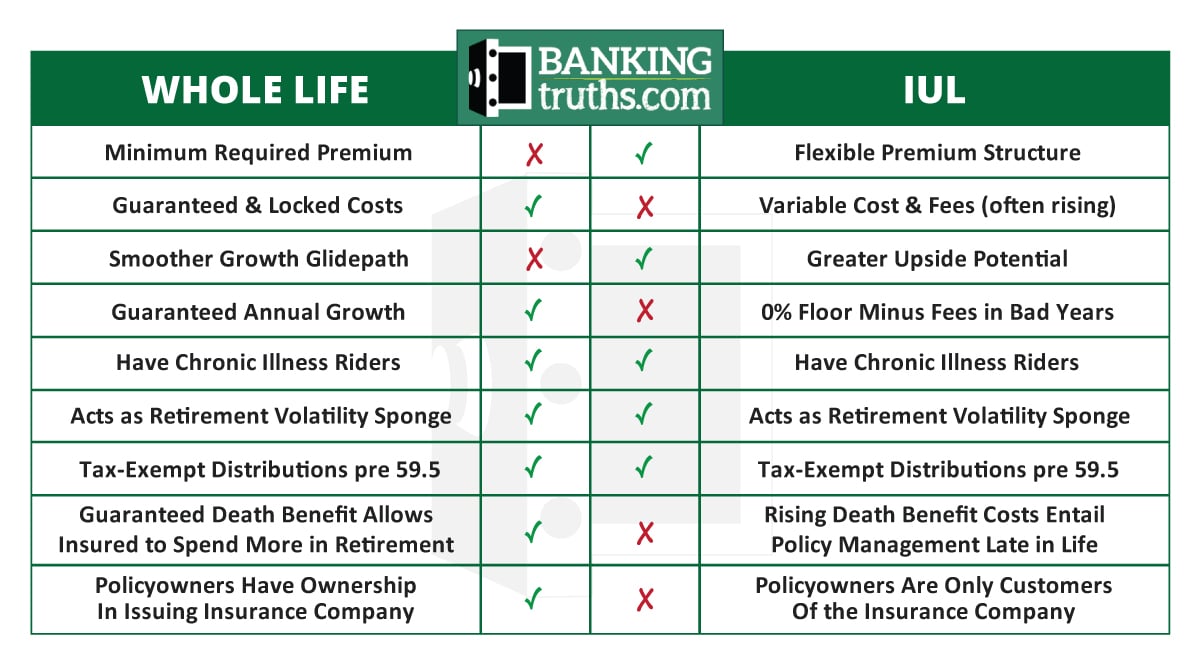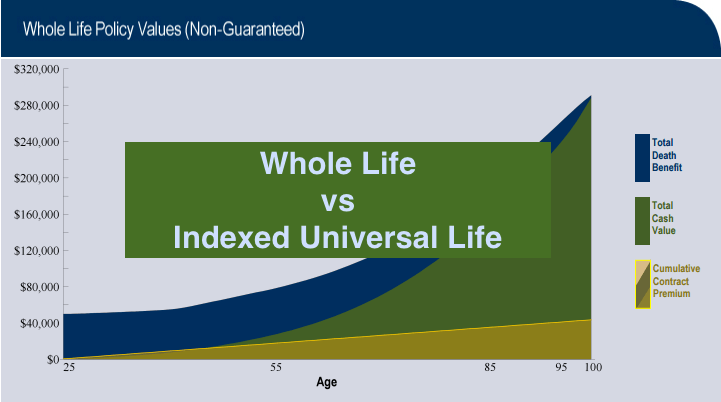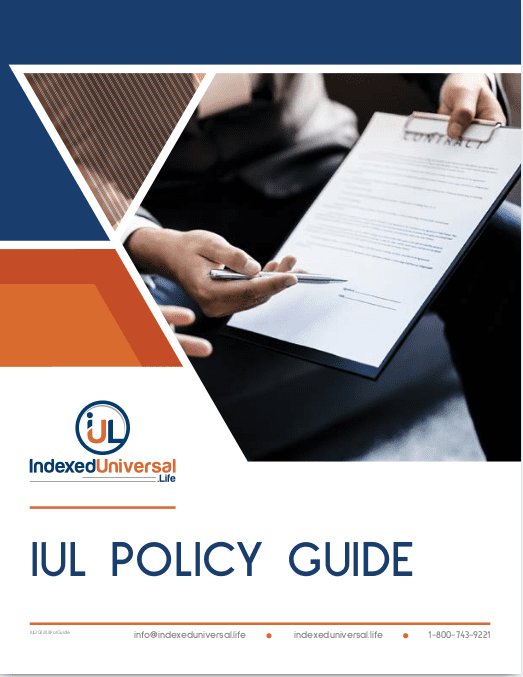All Categories
Featured
Table of Contents
Do they contrast the IUL to something like the Lead Overall Stock Market Fund Admiral Shares with no lots, an expenditure proportion (ER) of 5 basis factors, a turnover proportion of 4.3%, and a remarkable tax-efficient record of distributions? No, they compare it to some terrible actively handled fund with an 8% load, a 2% ER, an 80% turnover ratio, and a horrible document of short-term resources gain circulations.
Shared funds usually make annual taxable circulations to fund proprietors, also when the worth of their fund has decreased in value. Common funds not just call for revenue reporting (and the resulting annual taxation) when the common fund is rising in value, however can additionally enforce revenue tax obligations in a year when the fund has dropped in value.
You can tax-manage the fund, collecting losses and gains in order to lessen taxable distributions to the capitalists, but that isn't in some way going to transform the reported return of the fund. The ownership of mutual funds might call for the shared fund proprietor to pay approximated tax obligations (best indexed universal life companies).

IULs are simple to position to make sure that, at the owner's fatality, the beneficiary is exempt to either income or inheritance tax. The exact same tax obligation decrease methods do not function almost as well with mutual funds. There are numerous, frequently costly, tax obligation catches connected with the timed buying and selling of shared fund shares, catches that do not put on indexed life insurance policy.
Chances aren't extremely high that you're mosting likely to go through the AMT because of your mutual fund distributions if you aren't without them. The rest of this one is half-truths at finest. While it is real that there is no revenue tax obligation due to your beneficiaries when they acquire the earnings of your IUL plan, it is likewise real that there is no earnings tax due to your heirs when they acquire a mutual fund in a taxable account from you.
Irl Insurance
The federal estate tax obligation exception limitation mores than $10 Million for a couple, and expanding yearly with rising cost of living. It's a non-issue for the vast bulk of medical professionals, a lot less the rest of America. There are far better means to avoid estate tax obligation issues than purchasing investments with low returns. Shared funds might create income taxation of Social Safety and security advantages.

The development within the IUL is tax-deferred and may be taken as free of tax revenue by means of financings. The plan proprietor (vs. the common fund manager) is in control of his/her reportable income, thus enabling them to minimize and even get rid of the taxation of their Social Protection benefits. This is excellent.
Below's one more very little problem. It's real if you purchase a shared fund for state $10 per share prior to the distribution date, and it disperses a $0.50 distribution, you are after that going to owe taxes (most likely 7-10 cents per share) despite the fact that you have not yet had any type of gains.
In the end, it's really about the after-tax return, not just how much you pay in taxes. You're likewise probably going to have more money after paying those tax obligations. The record-keeping demands for having shared funds are dramatically more intricate.
With an IUL, one's documents are kept by the insurance provider, duplicates of annual statements are mailed to the proprietor, and distributions (if any kind of) are amounted to and reported at year end. This one is additionally sort of silly. Obviously you must keep your tax records in situation of an audit.
Difference Between Universal Life Insurance And Whole Life Insurance
Barely a reason to buy life insurance. Common funds are commonly part of a decedent's probated estate.
On top of that, they are subject to the hold-ups and expenditures of probate. The earnings of the IUL policy, on the other hand, is always a non-probate circulation that passes beyond probate directly to one's named beneficiaries, and is for that reason exempt to one's posthumous lenders, unwanted public disclosure, or comparable hold-ups and costs.
We covered this under # 7, yet simply to evaluate, if you have a taxed mutual fund account, you must place it in a revocable count on (and even less complicated, utilize the Transfer on Death classification) in order to prevent probate. Medicaid incompetency and lifetime income. An IUL can provide their owners with a stream of earnings for their whole life time, despite for how long they live.

This is valuable when organizing one's affairs, and converting possessions to income prior to an assisted living facility arrest. Mutual funds can not be transformed in a similar way, and are virtually constantly taken into consideration countable Medicaid possessions. This is another silly one supporting that inadequate people (you know, the ones that require Medicaid, a government program for the poor, to spend for their assisted living facility) ought to use IUL rather than mutual funds.
What Is Group Universal Life
And life insurance policy looks terrible when compared relatively against a retired life account. Second, individuals that have cash to acquire IUL above and past their retired life accounts are mosting likely to have to be awful at managing money in order to ever get approved for Medicaid to pay for their nursing home expenses.
Chronic and incurable disease rider. All policies will certainly permit a proprietor's very easy accessibility to money from their policy, often forgoing any kind of surrender charges when such individuals endure a severe ailment, require at-home treatment, or end up being restricted to a retirement home. Common funds do not offer a comparable waiver when contingent deferred sales charges still use to a common fund account whose proprietor requires to offer some shares to money the costs of such a keep.
Best Indexed Universal Life Products
You get to pay more for that benefit (cyclist) with an insurance policy. Indexed universal life insurance gives death benefits to the beneficiaries of the IUL owners, and neither the proprietor neither the beneficiary can ever lose money due to a down market.
Currently, ask on your own, do you really need or desire a death benefit? I absolutely don't need one after I reach monetary self-reliance. Do I desire one? I mean if it were inexpensive sufficient. Certainly, it isn't cheap. Usually, a buyer of life insurance policy pays for the true price of the life insurance policy advantage, plus the costs of the plan, plus the revenues of the insurance coverage company.
Universal Life Insurance Agent
I'm not totally sure why Mr. Morais included the entire "you can't lose cash" once again below as it was covered quite well in # 1. He just wished to duplicate the most effective selling factor for these things I expect. Again, you don't lose nominal bucks, but you can lose actual dollars, along with face major chance expense because of reduced returns.

An indexed universal life insurance policy plan proprietor might trade their plan for an entirely various plan without setting off revenue tax obligations. A mutual fund proprietor can not move funds from one mutual fund business to another without offering his shares at the former (therefore causing a taxable event), and repurchasing brand-new shares at the latter, typically subject to sales costs at both.
While it holds true that you can exchange one insurance coverage policy for another, the reason that individuals do this is that the very first one is such a terrible policy that even after buying a new one and going through the very early, adverse return years, you'll still appear ahead. If they were sold the appropriate plan the first time, they shouldn't have any kind of desire to ever before exchange it and go through the very early, adverse return years once again.
Latest Posts
Iul Benefits
The Difference Between Whole Life And Universal Life Insurance
Cap Life Insurance